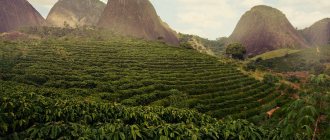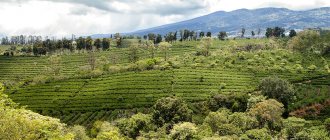China has been growing coffee for many years, and recently the industry has expanded enough that wholesale supplies have also increased. Although the Chinese themselves do not often drink such a drink, since most of the coffee beans grown in China are sold overseas.
History of coffee in China
Unlike Japan, which does not have plantations on its territory, China grows several interesting species on its own (and, of course, purchases huge quantities from other countries for production).
According to historical records, back in 1884, a British businessman imported 100 Arabica trees to Taiwan, and around the same time, a French missionary brought Arabica seeds to mainland China, in Binchuan County, Yunnan Province. Most of the trees he planted are still bearing fruit today.
As plantations matured and commercial production began in southern Yunnan, coffee consumption began to increase in Guangdong and Shanghai. In the 1920s and 1930s, Shanghai was known as the "Paris of the East", and enjoyed a coffee culture modeled after European capitals. The cafes were one of the many symbols of the city's international atmosphere. After China's liberation from Japanese influence in the mid-20th century, most of Shanghai's wealthy population left, and the cafes closed in their wake. An outbreak of leaf rust in growing areas in Yunnan has also disrupted production.
The return of Chinese coffee
By the time China opened up to the world, Yunnan's coffee plantations began to expand again.
Having established supplies of beans in the early 1990s, large multinational instant coffee producers began producing milky-sweet 3-in-1 instant varieties to appeal to the Chinese who were accustomed to their tea. Most locals didn't like the bitter taste of the refried beans, so manufacturers started adding a lot of sugar and milk powder.
Despite the growing appeal of instant coffee, only a very small percentage of the population drank it at all. The hot drinks market was still dominated by tea. The high price of this drink compared to traditional Chinese teas has led many to consider it a symbol of the bourgeoisie.
We owe such popularity of 3-in-1 coffee to the Chinese. And today the country exports a huge amount of this product.
Famous brands
Companies such as Nescafe, Maxim, Maxwell and Kraft purchase their raw materials in China. So, when you buy coffee from these producers, you are drinking exclusively Chinese coffee. A very large part of Chinese coffee is processed into instant coffee. The monsters of the coffee industry buy Chinese coffee in very large quantities, so that there is practically no coffee left for the Chinese themselves. Thus, the Chinese are trying to expand their coffee plantations so that there is also enough coffee for their population.
Coffee trees were first planted by French missionaries at the end of the nineteenth century. But despite this, Yunnan coffee is little known.
China has long been a closed country, and due to the fact that its location was quite inaccessible, Chinese coffee was not exported for more than a hundred years. All products grown on Chinese plantations in the Himalayas were consumed exclusively by their population. Even those few who knew about Chinese coffee could not try it, but could only appreciate it from hearsay.
Coffee consumption in modern China
Coffee corporations are eager to dominate such a huge market, so the coffee culture here is being promoted furiously, with the West playing a big role. The older generation prefers tea, but young people in large cities are happy to imitate American culture and are increasingly choosing such drinks for themselves.
Starbucks is actively entering the market at present. Their establishments existed before, but since 2020 alone, almost 500 new establishments have opened in different regions. People usually take drinks with them, and many cafes don’t even have tables and chairs—in large cities, customers don’t have that much to worry about. But still, there are cafes in the classical sense, local establishments are opening, and coffee culture is developing.
How to brew and drink Chinese tea correctly
The Chinese tea ceremony is a complex and mystical event. Water is poured from vessel to vessel and poured into cups. The conversation flows along with the water and fascinates the assembled guests.
If you want a tea ceremony, you can learn, purchase the appropriate attributes, expensive ceremonial teas and perform a special event at home. It is possible to reveal the aroma of Chinese tea much easier. The main thing is to follow simple rules.
Chinese teas are prepared by pouring rather than infusing. The process takes literally a few seconds. First of all, you should let your guests enjoy the aroma. It is imperative to “marry” the teapot and leaves; for this, the dishes are rinsed with hot water, only then the tea leaves are placed there and poured.
Different varieties are filled with water at a certain temperature, you can read about this on the packaging. The first brew of tea is not drunk, it is poured out and water is immediately poured into the kettle again. Good green tea can withstand up to 8 infusions, each time revealing new facets of taste.
TIP: It is worth having a separate teapot for each type so that the flavors do not mix.
Where does Chinese coffee grow?
Like other countries, China has different varieties within different regions and subregions.
The main coffee growing regions in China are Yunnan, Fujian and Hainan.
- Fujian and Hainan Island are famous for growing Robusta and account for only about 5% of total production.
- Arabica cultivation in Yunnan accounts for the remaining 95%. This province borders Vietnam, Laos and Myanmar. There are several different growth regions in Yunnan; however, they are all mainly located south of the city of Mujiang, which is divided into two parts by the Tropic of Cancer. It is impossible to grow anything north of the tropics.
The variety grown mainly in Yunnan is Catimor, selected for its resistance to leaf rust, high yield and hardiness. Over the past five years, significant efforts have been made to diversify into new varieties such as Typica and Bourbon, but leaf rust is still a problem.
The extremely mountainous province of Pu'er, known around the world for its fermented teas, is quickly emerging as the coffee bean-producing capital of China. The region, which is larger than Ecuador, produces almost half of the country's total output.
Ironically, the most consumed coffee product among the Chinese is instant coffee, made from robusta beans, 95% of which come from Vietnam.
The supply chain continues to evolve
Dry processing is easy to operate, representing the most traditional and cheapest method of processing coffee beans, as well as the most common method. Deep processing involves processing roasted and ground coffee. This method is most suitable for making espresso, which is also the type of bean most commonly used in Chinese coffee culture. With the rapid growth in the consumption of coffee drinks, many manufacturers across the country are actively involved in the coffee processing industry. Companies such as Dehong Hougu Coffee Company, Hainan Lishen Company, Baoshan Orchid Company, Yunling Coffee Company are focusing on creating a product chain that will allow them to be competitive in the coffee bean industry in China.
Help from Nestle and Starbucks
The main coffee growing region is in Yunnan province, accounting for 98% of coffee production. Nestlé set up agricultural support services in Yunnan and has been the largest buyer ever since. Another international leading firm, Starbucks, followed Nestle by setting up its own sourcing company in Yunnan in 2009. Nestlé operated several collection stations throughout Yunnan, while Starbucks also set up a support center for smallholder farmers.
Starbucks plans to build coffee roasting facilities
There are few coffee roasting facilities in China compared to Western countries. However, their numbers are growing due to the growing popularity of coffee and the demand for specialty coffee companies. The country has large commercial roasting facilities that primarily engage in mass production of instant coffee. Along with this, there are also single-store roasters that often strive for higher quality and roast beans in smaller volumes.
Coffee Market in China: Starbucks Coffee
In 2020, Starbucks China announced that it would invest approximately US$130 million to open a roastery in 2022. The project will house Starbucks' largest roasting facility, including a roasting plant, warehouse and distribution center. This will strengthen the coffee industry in China. In addition to roasting, once operational, the park will integrate the management and processing of a green coffee bean warehouse. With plans to host a highly automated and intelligent distribution center that will become the heart of Starbucks China's distribution network. The facility will also serve as a training ground for coffee roasting.
Chinese specialty coffee
Most coffee produced in the Middle Kingdom is a commercial variety, but about five years ago producers became interested in the opportunity to grow a truly valuable product. The problem was that few people in the country could advise how to grow and process special trees.
With the help of organizations such as CQI and SCAA/SCAE-certified schools across the country, this has slowly begun to change. Better practices at farm level and improved wet and dry processing are already producing a higher quality product.
At the 2020 Best of Yunnan (hosted by CQI and Yunnan Coffee Exchange), 25 international judges rated the region's best coffee with an 84+ rating.
Chinese coffee brands
The local brands mentioned below are the ones with the most presence in the Chinese market locally.
Lisun 力神
Founded in 1987 on Hainan Island, Lisun is the first company to introduce instant coffee in China. The brand became famous for its coconut and creamy drink flavors. The company has its own coffee plantation. It is constantly expanding and updating its product range by developing different flavors, ready-to-drink drinks, and selling roasted beans.
Hogood 后谷
Hogood is a Yunnan-based company founded in 2007. It is one of the largest processors of coffee cherries grown in China and one of the best-selling local brands. Hogood produces and sells roasted coffee, including whole beans, ground and instant. The brand also exports its products to Europe and Korea.
Nanguo
Founded in 1992, Nanguo uses Hainan's unique products such as coconut and coffee beans to develop its products. Its products are primarily sold as dry mixes.
Fushan Coffee
Fushan Coffee was founded in the 1980s in Hainan province and its business focuses on growing, processing and selling beans. The company is one of the leaders in Hainan and one of the main local coffee brands in China.
Chun Guang 春光
Founded in 1996 in Hainan, Chun Guang grows nuts and coffee that are used to make sweets, drinks or cookies. The products are sold in China but are also exported to about 30 countries. The company sells roasted ground and instant products.
Popular brands of coffee products in China
ILLY is the market leader
Founded in Trieste in 1933, ILLYC produces and markets a unique blend of 100% Arabica espresso and is a leading premium quality brand. The company also created and runs the Coffee University, a center of excellence that provides comprehensive academic and hands-on training for producers, baristas and fans covering all aspects of the product. ILLY sources products directly from high-quality Arabica growers through sustainable partnerships. Out of its headquarters in Trieste, the company encourages long-term partnerships with the world's best producers in Brazil, Central America, India and Africa, exchanging know-how and technology and paying remuneration above market value. The Italian company ILLYC has been in China for 15 years, during which time it has established itself as a clear leader in the sale of coffee products in China, accounting for 30 percent of the imported segment of roasted and ground coffee. With a long and renowned history as an innovator in the coffee industry, ILLYCaffe is perhaps most popular for its signature blend of nine Arabica coffees selected from the world's finest harvests. Along with introducing new products, ILLYCaffe is bringing its products to market through multiple channels. The company works with more than 1,000 clients in China in the hotel, cafe and restaurant segments. In addition to this, the Italian style ILLYCaffe franchise has three retail locations throughout the state and there are nine additional ILLYCaffe retail locations offering the full range of ILLY products - beans, ground coffee and capsule machines.
Megafactory for the production of Illy coffee
Lavazza: premium coffee
Yum China Holdings has formed a joint venture to develop the Lavazza concept in China. As a first step, Lavazza's flagship store in Shanghai opened its doors to customers in Asia. The Lavazza Group has recently embarked on an international development process aimed at expanding into new markets. Meanwhile, Yum China has made encouraging progress in the Chinese coffee market. The brand sold 130 million cups of coffee to Chinese consumers in 2020. More than just classic Italian espresso, Lavazza uses a variety of roasting and extraction technologies, introducing unique coffee creations to China for the first time. Bel Paese Coffee is an exclusive range created for the Chinese market, offering “a unique journey of flavors from different regions of Italy.”
Lavazza - Company secrets
Rwandan coffee enters China market
Rwanda was the first African state to join the Alibaba-run electronic global trading platform. Organized by the Alibaba Group, the online event aimed at promoting Rwandan coffee is available on the Chinese e-commerce market. The event featured coffee from Gorilla Coffee, a brand from Rwanda Coffee Company that has gained an estimated 20 million fans following it online. By the time of purchase, up to 3,000 pieces (about 1.5 tons) of coffee were purchased online in 1 minute. Additionally, as a result of the agreement, Rwandan coffee is available on Alibaba platforms. Coffee lovers in China can also access the product through Tmall.
Coffee production in Rwanda
Marketing and trading of Chinese coffee
In 2020, about half of Yunnan's harvest was exported. Most of the grains grown in the Middle Kingdom are commercial varieties, and exports mainly consist of green beans sent to European markets. The United States is also an export market, and Starbucks buys more than half of the beans imported into the United States from China.
The main buyer is Germany, followed by the USA and Belgium, with Saudi Arabia and France also important destinations.
Import
China's own production of coffee beans is low and it has always been considered an importing country. Most of the purchased grain comes mainly from Vietnam (47.8% of total imports), Indonesia (12.4%), USA (7.7%), Brazil (6.3%), Malaysia (4.1%) and Colombia (3.8%).
The four largest operators in the local market are:
- Nestlé (lead brand: Nescafe);
- Kraft Foods (leading brands: Jacques Vabre and Grandmother);
- SaraLee (brand name: Café do Ponto);
- Massino Zanetti (lead brand: Segafredo).
Experts predict that all large corporations will enter the market in the next 5 years.
Let's sum it up
Consumption of Chinese coffee in the country and abroad is growing rapidly, and may reach 2.8 million packs by 2020. This is roughly equivalent to current UK consumption. Starbucks alone has opened more than 400 new outlets in different cities in China in a couple of years, and other similar companies are also growing at the same pace.
Thus, among consumers in China, coffee drinks are acquiring an increasingly modern image and are becoming popular among young people.











